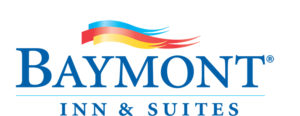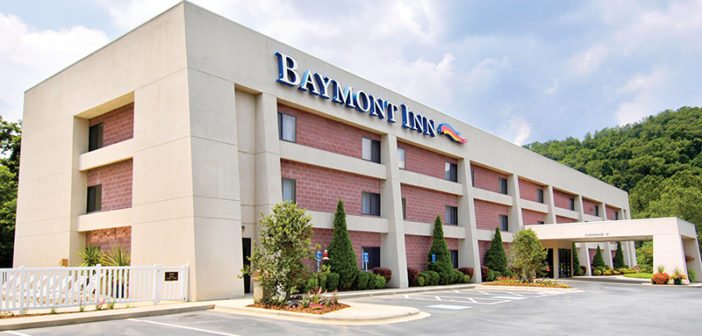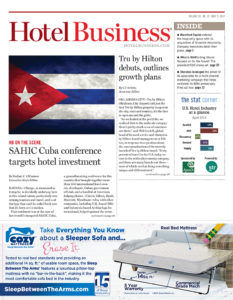PARSIPPANY, NJ—In a decade that gave the world disco, a presidential resignation and great-looking Chevy Camaros, the 1970s also saw the birth of a new economy lodging brand named Budgetel.
Birthed in Wisconsin in 1974 by the Marcus Corp., the new-construction brand was the forerunner of what is today’s Baymont Inn & Suites.
During its formative years and into the 1990s, Marcus Corp. franchised and grew the brand, adding upgrades and improvements, and repositioned it as a midscale offering.
In 1998, the brand’s name was changed to Baymont Inns (supposedly a contraction of the phrase, “From the bay to the mountains”) to reflect its new segment position. The company also kept one Budgetel operating in Wisconsin to secure the brand name.
Six years later, La Quinta Corp. acquired the brand, before the corporation itself was acquired by The Blackstone Group, which reflagged many of the Baymont properties to La Quintas.
The name was changed to Baymont Inn & Suites and, in 2006, Cendant Corp., the predecessor of current Baymont franchisor Wyndham Hotel Group, acquired the brand.
In 2009, Wyndham merged its AmeriHost Inns brand with Baymont Inn & Suites, creating a 240-hotel portfolio for Baymont, which has continued to grow, nearly doubling its distribution (at press time) and expanding across the United States and into Mexico and Canada.
And, according to Greg Giordano, VP of brand operations for Baymont Inn & Suites, there’s no slowdown in sight.
“Baymont is on the cusp of some explosive growth and opportunity. We’ve been ranked on Entrepreneur magazine’s ‘Top Fastest Growing Franchises of the Year’ in 2016 and 2017, and we were just listed as Money magazine’s ‘Best in Travel,’” said Giordano. “This brand has a big future and we’re just getting started.”
The executive noted the brand still embodies “the same good, old-fashioned service promise of ‘Hometown Hospitality,’ and it has held strong throughout the years for guests. It’s one thing that really stands out from other midscale hotels.”
For the most part, he noted, Baymont guests are value-conscious families and business travelers who are looking for “a welcoming midscale option to stay [in]when they’re out of town.”
Considered Wyndham Hotel Group’s fastest-growing brand, Baymont Inn & Suites experienced 6% net portfolio growth last year (adding about 50 hotels) and plans to welcome its 35,000th room this summer.
“Our wish list for new hotels includes primary and secondary urban and vacation markets. Many of our hotels rely on business from middle-skill business travelers: workers on crews, in construction and group organizations such as youth sports teams,” said the executive.
Although it has 80 hotels in the total pipeline, Giordano acknowledged the brand is just getting started in Canada and Mexico and plans to continue to grow in those countries.
“We’ll always evaluate opportunities abroad as long as they are the right owners and locations that truly represent the hometown hospitality Baymont stands for,” said the VP.
The Baymont product outside the U.S. is not significantly different, Giordano observed, noting the hotels in Mexico and Canada “embody the same warm, welcoming core design elements and service promise.” One slight difference, he acknowledged, is that the Baymont Inn & Suites Lazaro Cardenas in Mexico has a minimal charge for breakfast.
In growing Baymont internationally, the franchisor is taking different approaches. “Right now, we are working with individual licensees, although we are open to consider multi-unit or master-franchise agreements in the future,” said Giordano.
In terms of development, both domestically and internationally, the executive said the existing customer base is strong. “Nearly 30% of Baymont owners have been with the brand since it became part of Wyndham 10 years ago and more than 20% of our franchisees own multiple Baymont hotels. Entrepreneurs who have the same values see what we’re doing and want to be part of it,” he said.
Part of that desire likely stems from the brand’s interior prototype design, which, the VP said, has “really resonated with developers” as a vehicle for growth and consistency. “Plus, our rapid growth has generated excitement about the brand and, in turn, more growth,” said Giordano, who considers Baymont’s comp set “any midscale, limited-service hotel brand with a strong focus on service.”
Keeping the Baymont brand top-of-mind with developers is supported by the franchisor’s concentration on delivering a noteworthy product, Giordano indicated. “As part of the larger Wyndham Hotel Group growth strategy, we are laser-focused on quality. Each year, we say goodbye to hotels that do not meet our standards for quality and service as part of our efforts to maintain a strong reputation and consistent brand experience for our guests,” he noted.
In addition, Baymont has put several initiatives in place, including some aimed at owners/developers and some at guests. Giordano said developers appreciate the brand’s flexibility.
“Baymont’s prototype is designed to be adaptable to any market because it centers on the idea of welcoming
our guests,” he said. “We have a new hotel breaking ground in Page, AZ, that will have its breakfast room open up to an outdoor terrace. That works for the environment in a hot Arizona climate and for the hotel’s guests, so it’s something we were willing to consider.
“For guests, a room is a room,” he continued. “What sets a brand apart is service and personality. Guests appreciate feeling welcomed when they enter our lobbies and are delighted to have good company at breakfast through our Hometown Hosts. It’s the experience that makes the difference.”
Making a difference on another level also is indicative of the role the brand seeks to play in the overall scheme of hospitality. Given the longevity of Baymont, Hotel Business asked Giordano what he saw as most transitional for the brand in its history.
“Since 2006, our focus has been on welcoming every guest, associate and community member. That’s why we launched a partnership with The Arc, the nation’s leading advocate for people with intellectual and developmental disabilities, or I/DD, to help our hotels find great employees,” he said.
“We launched the collaboration at the same time we introduced a new breakfast attendant standard, the Hometown Host, combining service for our guests with meaningful change in our communities. Our collaboration with The Arc not only connects our franchisees to a resource attracting associates who embody our signature culture of neighborly hospitality for guests, but also demonstrates to all communities of diversity they have an advocate in Baymont,” said Giordano.
With so many hotel brands emerging since Baymont was founded, the VP indicated it is important to alert guests—and potential/new developers/owners—this is a brand with roots, making sure to reference its DNA while still looking to the future.
“We call ourselves the hotel next door and we mean it. We may be branching out from our Midwest roots but we’re still holding tight to our Midwestern values and our signature service promise: Hometown Hospitality. We pride ourselves on our ability to connect with our guests. Whether it’s a family, a business owner or a championship soccer team, we make it our priority to understand their needs and make sure they’re feeling right at home. That’s the heart of Hometown Hospitality,” said Giordano, who wants to bring that brand message across America and beyond.
“We’re on a quest to conquer all 50 states. We only have seven more states to go, and we’re bringing on new hotels every day to help make sure we’re in every hometown and neighborhood across the U.S.,” he said, noting he’s “always amazed” at how fast the brand has grown.
“It does have very regional roots, but the concept of simple, old-fashioned neighborly hospitality really resonates with everyone. The options are limitless for Baymont,” he concluded. HB
 1974: Marcus Corp. launches the brand in Oshkosh, WI, as Budgetel, a new-construction, prototypical economy brand.
1974: Marcus Corp. launches the brand in Oshkosh, WI, as Budgetel, a new-construction, prototypical economy brand.
1986: Marcus Corp. begins franchising Budgetel.
1990s: Throughout the 1990s, Marcus Corp. improves the brand, moving it into the midscale segment.
1998: The name of the brand is changed to Baymont Inns to be more reflective of its new position in the midscale segment; Marcus Corp. keeps one Budgetel operating in Wisconsin to secure the brand name.
2004: La Quinta Corp. acquires the limited-service division of Marcus Corp., which includes both Baymont and Budgetel.
2005: La Quinta is sold to The Blackstone Group, which, in turn, reflags numerous Baymont properties to La Quintas.
2006: The brand name becomes Baymont Inn & Suites and is acquired by Cendant Corp., predecessor of the Wyndham Hotel Group, the brand’s current franchisor.
2007: Budgetel’s U.S. and Canadian franchise operations and trademarks are sold by Blackstone to an investment group led by industry vets Mukesh Patel and R.C. Patel. Over the next decade, the brand will have various homes, landing with Doug Collins’ Hospitality Lodging Systems, where it currently lives in 2017.
2009: Wyndham merges its AmeriHost Inns brand with Baymont Inn & Suites; Brand reaches more than 240 hotels.
2015: Baymont opens 400th hotel and first hotel in Mexico, the Baymont Inn & Suites Lazaro Cardenas (a first for the brand outside of the United States and Canada); Brand triples in size since 2006; Brand updates hotel model with turnkey, interior prototype design that offers cost efficiencies for owners.
2016: Baymont Inn & Suites introduces new Hometown Host position, launched in collaboration with national advocate The Arc, to help owners fill the role and make a difference for people with intellectual and developmental disabilities.
2017: The hotel brand, at press time, has 437 hotels open representing 34,519 rooms.


